Ellen and Jim Have a Blog, Too
We are two part-time academics. Ellen teaches in the English department and Jim in the IT program at George Mason University.


_The Pallisers_ 4:7, The Beginner (Phineas Finn) (1) · 27 January 08
Dear Harriet,
Another summary and commentary on the 1974 BBC Palliser film series, script Simon Raven, director Hugh David, producer Martin Lisemore. The previous part (3:6) was an open-ended transition in which the Lady Glencora and Plantagenet matter (Susan Hampshire and Philip Latham) was partly resolved, the Alice & George Vavasour (Caroline Mortimer and Gary Watson, to be seen in the series no more) matter was set adrift, and the new matter or novel, the story of the ultimately success career of the Irish politician, Phineas Finn (Donal McCann), begun. I’ll going to divide this one into two parts. First a thematic perspective and description; tomorrow or the next day I’ll offer a concise summary of the episodes with brief comments.
As written and dramatized by Simon Raven, the story thread of this Part (Volume 4, Part 7) tells one aspect of the story Trollope also tells: the story of a young male beginner in public life. We are watching a young man learn lessons in how to behave at a salon, at a great country house where powerful politicians gather, how to inveigle invitations to such a house, and the price of keeping up “friendships” (the scare quotes are deserved though I won’t repeat them) which lead to such invitations, memberships in the right clubs, and further friendships.
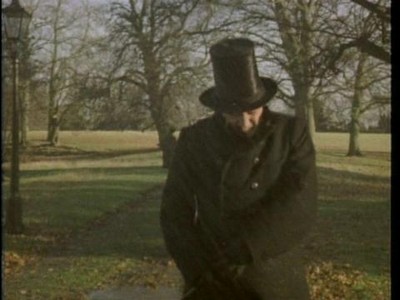
Phineas Finn (Donal McCann) going to party in rain; only for the last five minutes does he take a carriage for 6 pence (Pallisers, (BBC 1974)
Phineas as we first see him; he hasn’t got the money to hire a carriage all the way, but is determined to arrive almost in style.
The price Phineas pays includes more than this kind of absurdity. It’s seen in scenes which dramatize pressure on him to sign notes indebting yourself for money you have not yourself borrowed; living modestly on a small income while attempting to keep up with the very rich in clothes, styles, and habits. It is in fact a primer on how and why when an idealistic if pragmatic young man gets access to power, he does not act on behalf on those he partly wanted to get into power to support: the working and middling classes, people like himself. The close of the Part shows Phineas hounded for debt while he practices a speech where he is arguing that the legislation he knows is urgent (in this film it’s suffrage and the secret ballot) must be put off for a while.
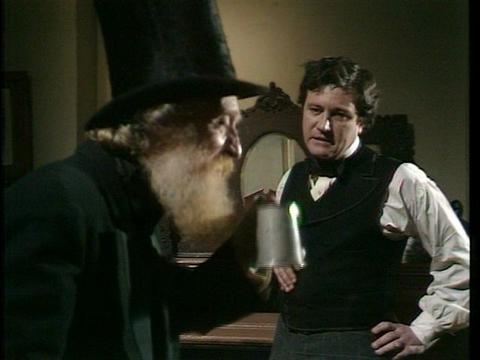
Phineas as we last see him in the episode: telling Mr Clarkson (Sidney Bromley) he’s had not one penny of the money loaned to Laurence Fitzgibbon
Phineas’s awkwardness, the over lessons in ostracizing and grovelling (through “grovelling” basically—an unkind word used by Lord Chiltern [John Hallam], but accurate enough) before others (e.g. Madame Max, played by Barbara Murray) the apparently hard earl’s daughter, Lady Laura Standish, then Kennedy (Anna Massey) teaches Phineas. As in Trollope’s novel, we see Phineas attracted to heiresses (e.g., Violet Effingham played by Mel Martin), partly because they are glittering prizes, but also because their money would set him up.
Phineas’s story is contrasted to that of Lady Glencora and Plantagenet Palliser on the one hand, and Oswald, Lord Chiltern on the other. Basically, somewhat improbably, Lady Glencora Palliser as a result of having gotten pregnant and won the respect and trust of her husband and learned to stay loyal and trust in him, becomes without any training at all (unlike poor Phineas) a swiftly successful society hostess. Her aplomb is also contrasted with her husband’s social awkwardness, and inability not so much to recognize, but enact the truth that a lot of the work of politics is done through socializing and fitting in with others.
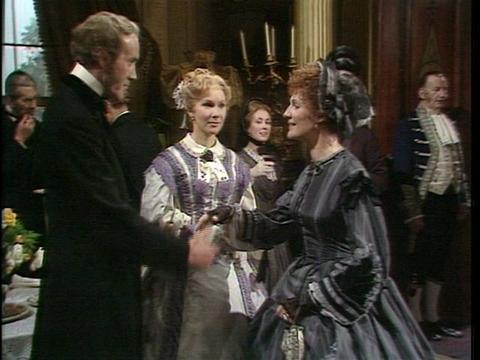
Madame Max (Barbara Murray) receiving a less than warm welcome from Plantagenet (Philip Latham) and Lady Glencora Palliser (Susan Hampshire).
When Madame Max moves on, Lady Glen tells Plantangenet that he must smile. She’s good at the smiling game already it seems. A natural?
In Raven’s film Lord Chiltern takes on the role of uncompromising non-politician, the person not even for rent (much less for sale) on any terms but his own. This role is adumbrated or part of Trollope’s portrait of the character, but not emphasized in quite this way; his downright honest integrity (which his title and rank brought him up to expect, and his sister’s having sold herself to a nouveau rich Scots politician, Kennedy [Derek Godfrey] is central to his rough and even violent way of making love to Violet Effingham.
The episode opens very differently from the book, Phineas Finn. We have had in 3:6 our first meeting with Finn first in the corridors of power staunchly holding onto his liberal values in front of Bungay (Roger Livesey) and Barrington Erle [Moray Watson] (two people who have less appreciation for this could not be found), and then his lodgings with Mrs Bunce where we discover he hasn’t got the expensive clothes he really should have to go to the Christening, where we see him next and watch him snubbed by the Duke of St Bungay and his allies; and we have heard about him from the now ever so complacent amused Lady Glencora Palliser, as a 7 foot Apollo and other such phrases.
Now we are in the second novel of the films proper, the Phineas matter and our first very long scene is of Lady Glencora’s party. This scene corresponds to the opening garden party of 1:1 where we had choral figures filling us in on the opening of the Glencora and Palliser love stories (which included George Vavasour so thereby began the Vavasour matter love stories too); and the closing scene of the Christening, 3:6 where we also met new characters and saw others disappear. As in 1:1 Raven has the problem of introducing all sorts of new characters and setting a new mood.
You’d think that with 26 parts Raven and David would have ample room and time for a leisurely pace. So it seemed especially in Parts 1 through 3 of CYFH?. In this episode the episodes pile up and are shorter. It’s as if Raven has too much to get in, and he resorts to too many epitomizing dialogues. These short scenes don’t allow for much in-depth psychological presentation (as the 1:1-3:6 parts do), nor discussions of serious issues (as Trollope’s novel does—for example, Chapter 18 where we read a dialogue between Turnbull and Monk [Bryan Pringle] where Monk defends the complicit life he must lead to be in power on the grounds he will be able to influence policy and Turnbull attacks going into office as sheer corruption). But Raven does gives us a few very long scenes (this party given by Glencora, Lord Brentford’s dinner, an evening on the terrace of Kennedy’s mansion at Loughlinter), but to dramatize how men and women behave in public and how politics works in private conversations in such places and just outside them. Raven is trying for a filmic grammar equivalent to a political book.
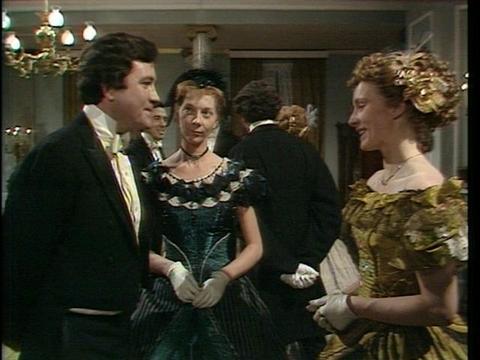
Phineas Finn Lord Brentford’s party, being introduced to people by Lady Laura (Anna Massey), among them the heiress, Violet Effingham (Mel Martin)
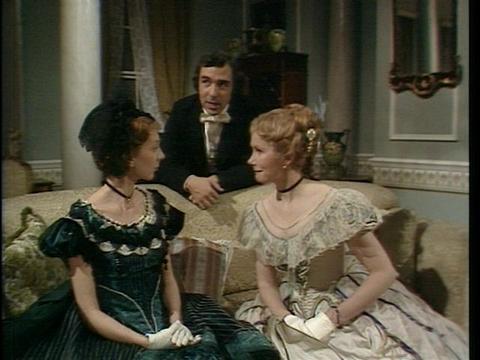
Lord Brentford’s party: Lady Glencora, Laurence Fitzgibbon (Neil Stacey) and Lady Laura Standish gossiping, not very kindly, about people on the other side of the room
Raven has more than the problem of presenting people phonily smooching (which is a long-drawn out process and includes nuanced scenes of people being scapegoated heartlessly just as we see Lady Laura doing to Phineas), but also to suggest political issues. It would kill an entertain to give us disquisitions on political issues so he must chose obvious ones he hopes his viewers will understand: thus the secret ballot (which is only one issue of Phineas Finn; the others being rotten boroughs, redistribution, the suffrage, and the complicated tenants rights which might cause controversy since some viewers are on the side of property owners no matter what, others are variously not sympathetic to Irish people) and suffrage, both of which are (Raven hopes) obviously easy and will draw some sympathy from viewers. He also brings in for mockery Palliser’s decimal hopes—as that is easy too.
Linkage back and within: The horizons or points of view and events that came before in the Lady Glencora and Plantagenet Palliser matter may be seen to provide a horizon against we view Pallisers 4:7. While a good deal of 4:7 is taken almost straight from a few chapters in Phineas Finn (though dramatized when it’s not in Phineas and added to from other chapters in PF), much is presented in terms we are familiar with not contextualized as in Trollope’s book, but from what’s gone before in the previous films we’ve seen. So, in Pallisers 1:2 one of the problems Lady Glen has is to assert her independence: she is not allowed to invite guests; not allowed to be a hostess; she is not allowed to read what she wants; at the end she is allowed a friend, but this is not enough. By 4:7, she has somehow asserted her right and shows her ability to be a hostess.
The woman at risk is Madame Max; at the close of the opening salon scene we see Lady Laura urging Phineas to ostracize Madame Max as “not of the right set:”
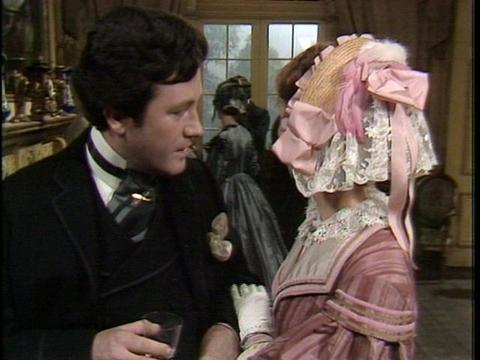
Lady Laura urging Phineas Finn to ostracize Madame Max
We could regard George’s Vavasour’s story (which begins in 1:3 and ends in 3:5) as one of contrast totally: for example, once he is disinherited and so loses the intelligence and decency he occasionally shows in say his dialogue with Plantagenet in the London streets and his one speech in the Commons. George is desperate for money and Finn has gotten in luckily, but George shows that he is by gut instinct amoral and ruthless and Finn not. George has taken advantage of Jane (Wendy Williams); Finn is not taking advantage of Mary Flood Jones (and later will act honorably by her when she gets pregnant). Finn would marry but does not try to take money before marriage (we already have a hint from Madame Max she would be willing to help him, but he is too young and naive to begin to understand her). Unlike George, Phineas struggles against debt; he avoids it; he is not violent and resentful, he is doing what he can to fit in and himself behave well. He hopes eventually to pass legislation on behalf of the Bunches and Irishmen like himself. He will not end a male outcast (like Burgo Fitzgerald [Barry Justice] and George Vavasour).
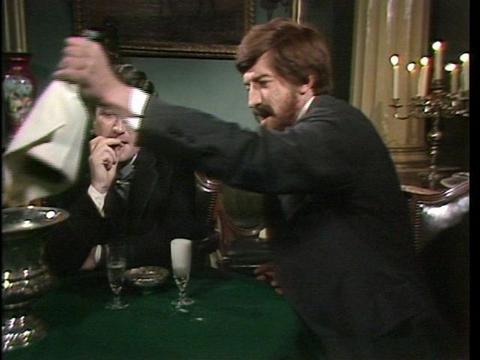
Phineas and Lord Chiltern (John Hallam) drinking at the club
When Phineas gets back to the Bunch establishment on the first night of Lady Glen’s first party, he tells Mrs Bunce he has been learning quite a lot about life. Among the lessons, how it’s okay for a lord like Chiltern to see his sister sold to pay his debts, to be violent and to spend his life drinking in elegant clubs and hunting across beautiful & farmed landscape.
Tomorrow, Part 2 of this letter: a summary of the episodes and individual comments on these, and more stills!
Sylvia
--
Posted by: Ellen
* * *
Comment
- From RJ:
“Thanks again for writing. Your observation that Lady Glen’s transformation into a successful hostess is “improbable” reminds me of my distrust for Trollope, who is very, very patriarchal. Women must accept their lot before their lives can take on any interest. Money in the bank may allow them a great deal of latitude as regards the terms on which they accept it (consider Miss Dunstable [Dr Thorne]), but accept it they must.
I hope that this finds you well.
rjk”
— Elinor Jan 28, 12:58pm #
commenting closed for this article
